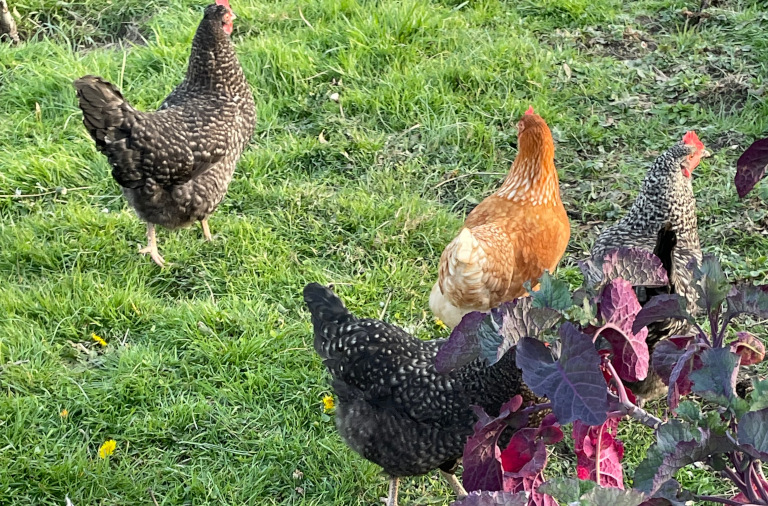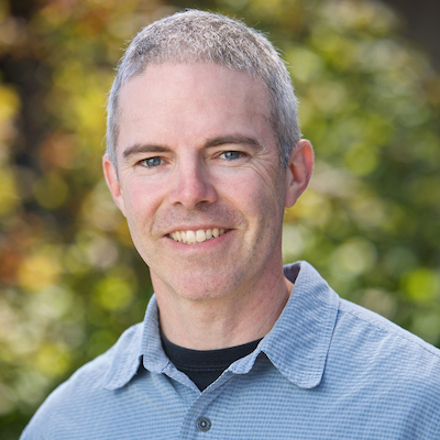Since 2015 Resilience has been publishing articles by Chris Smaje. Chris writes eloquently about a variety of sustainability-oriented topics, including critiques of what you might call “high-energy modernity” and forays into political economy, but his specialty is the role of small organic farms in a future that is more energetically and materially constrained. The subtitle of his book, A Small Farm Future, sums up his aim quite well: “Making the case for a society built around local economies, self-provisioning agricultural diversity, and a shared Earth.”
In “making the case,” Chris has criticized George Monbiot’s take on livestock farming and artificial meat. The debate first materialized in print six years ago when George wrote an article that appeared in The Guardian, and Chris wrote a critical response that appeared on his blog and in Resilience. In his article, George argued that the rise of cheap artificial meat should signal the end of all types of livestock farming, including that practiced by small organic farmers. In his response, Chris expressed surprise at George’s conclusions and argued that there’s a valid role for livestock to play on ecologically sound farms.
Their debate has since expanded into a larger quarrel over how to feed a growing human population, at a time when we’re experiencing worsening trends in soil depletion, chemical pollution, water scarcity, weather chaos, concentration of financial power, widening gaps between the rich and the poor, and other disconcerting environmental and social conditions. George wrote a book called Regenesis: Feeding the World without Devouring the Planet, that came out in 2022 and calls for an overhaul of global farming, including investment in artificial meat to free up grazing land. Chris’s book, Saying NO to a Farm-Free Future, came out this summer and directly challenges George’s proposals for the future of food. Following publication of his book, Chris wrote numerous articles that we have published in Resilience that continue to criticize high-tech industrially manufactured food while supporting low-input agrarian localism.
On October 4th, George posted to his blog an article titled “The Cruel Fantasies of Well-Fed People” that pushed back, and he reached out to Resilience to ask us if we would publish it. Although Resilience does not claim to be an unbiased journal,* we are often willing to publish opposing points of view, and we support dialog and debate on critical issues. But in this case, the editorial team decided not to publish it because (1) we felt like George made too many leaps in ascribing beliefs to Chris that misrepresent his position, (2) we thought George crossed a line in attacking Chris, and (3) there’s a power imbalance between these two writers; George has far more reach and influence. On October 23, Chris wrote a point-by-point response in Resilience to George’s “Cruel Fantasies” article, and George asked us a second time to publish his. The Ecologist reposted George’s article on October 6th and didn’t publish Chris’s follow-up. (Ed. note: The Ecologist has now published an alternative short response from Chris. You can find it here.) All this back and forth has led me to write the chronology and analysis you’re reading now.
Based on their bodies of writing, it appears that Chris and George share many underlying values, want many of the same things for people and nature, and would agree on premises such as:
- Everyone deserves access to adequate nutritious food.
- Agriculture, as it’s widely practiced today, is unsustainable, polluting, and wreaking havoc on soil, waterways, and habitats.
- We need to find ways of feeding ourselves (and conducting all manner of other human affairs) that are congruent with nature’s limits, avoid undermining the life-support systems of the planet, and allow other species to thrive.
- It’s better to prepare for tough times than to react after you’re mired in them.
A commenter (Joe Clarkson) on Chris’s Oct 23rd article hit the nail on the head in characterizing the rift. It’s not about why humanity is in a bind, and it’s not about whether we need to make massive changes to get out of the bind—it’s about how we might be able to get out of the bind. Clarkson says about cities, “There will just not be enough energy to maintain them and to keep food and other resources going into them. This puts everyone who lives in a city, and many others too, at risk for starvation and death. Smaje offers re-ruralization as a risk-reducing step and Monbiot offers a hypothetical synthetic food system.”
Like Clarkson, Resilience is more aligned with Chris’s view. Resilience and Post Carbon Institute (my employer and the parent organization of Resilience) have become a hub for articles and reports that wrestle with how society can function in a pro-social, environmentally sound way after the fossil fuel bonanza subsides. Our take is that we will have to power down, derive most of our energy from daily flows of solar energy, and relocalize production, including in the food sector, which will mean a reversal of the modern trend of urbanization. A few years ago, we even produced, edited, and distributed Jason Bradford’s report The Future Is Rural: Food System Adaptations to the Great Simplification. We are hoping for a rapid transition of agriculture to small organic farms that employ lots of people who produce enough food for everyone to thrive, all while working with nature to support habitat and biodiversity. This vision seems more practical and likely to succeed than a system that relies on high-tech, high-energy manufacturing of synthetic food, and more consistent with what’s required in other aspects of modern society.
While I’m addressing the issue of vision, as it applies to feeding people and the future of farming, I want to share something I recently learned from Elizabeth Sawin, the founder and director of the Multisolving Institute. Beth is an advisor to Post Carbon Institute, and we recently invited her to talk with our staff about the visioning practices she uses when working with students and other people confronting global warming and related environmental issues. She explained that people tend to develop their worldviews, behaviors, and actions based on simple rules. For example, if the simple rule in a corporate boardroom is “we must earn profits,” then the executives who run that corporation will see profit-making as a good thing, and they will act accordingly to ensure that they cut costs and earn lots of revenues. Beth further explained that, regarding how people treat nature and one another, there’s a battle between two worldviews, each based on simple rules. The first worldview, which is the one that put humanity in a precarious position of overshoot, is based on the simple rules of extraction, gaining power over, and domination. The second, which is an ecological worldview, is based on the simple rules of mutuality, being part of, and webs of relationships. When considering a vision for the future, it’s important to assess which of these two sets of simple rules that vision follows. I invite you to take a look at what George and Chris are proposing and see where you land.
Finally, I want to report that this was the least fun article I’ve written since, well, I can’t remember. My problem is that I have great respect for both George Monbiot and Chris Smaje. I hate to see these two deeply concerned environmentalists attacking one another. Having read their latest articles, I understand that their main beef (livestock or synthetic – sorry, I couldn’t resist) is with one another’s ideas. But I also sensed hurt and defensiveness behind their words. We need constructive debates about food and farming so that we can find the best ideas for addressing the desperate business at hand: figuring out how to live healthily on a healthy planet.
*It says right there on the website that “Resilience.org aims to support building community resilience in a world of multiple emerging challenges: the decline of cheap energy, the depletion of critical resources like water, complex environmental crises like climate change and biodiversity loss, and the social and economic issues which are linked to these.”






